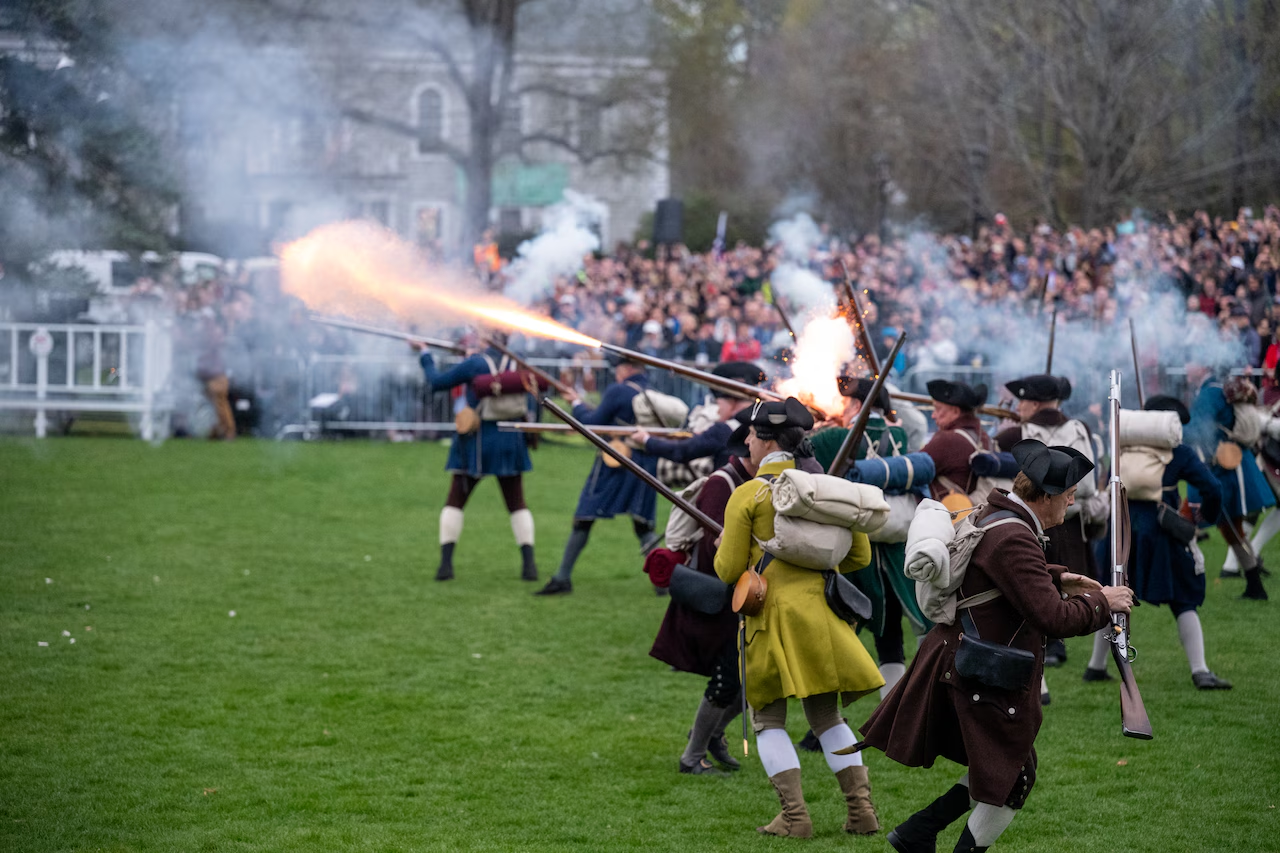Good Monday Morning, everyone.
The July 4 fireworks might be squarely in the rearview, but when it comes to celebrating the nation’s 250th birthday, Massachusetts still has miles to go before it sleeps.
Late last week, as you were getting ready to pack the car and head for the beach, the Healey administration announced that it had awarded $2 million in grants to 59 organizations across the state to highlight that history.
The money, which comes through the Massachusetts 250 Grant Program, will underwrite a range of projects, from immersive historical tours and exhibits to community festivals, the administration said in a statement.
Many of those efforts focus on honoring the contributions of the Indigenous, Black, Latino and LGBTQ residents and women who helped to shape that history, the administration said.
“These projects honor our shared history while telling the stories that have been left untold for too long, strengthening local economies and shaping a statewide celebration of our values and our future‚” Gov. Maura Healey said in the administration’s statement.
The cash released last week marks the second round of state funding. The administration provided $1.5 million in grants through the first round in September 2024.
The new round of funding “will bring people together to celebrate our shared history, especially as we approach Independence Day,” Lt. Gov. Kim Driscoll, a former Salem mayor, said, adding that the projects will help “spark curiosity, invite community and businesses to join in, and build real excitement as we count down to a once-in-a-generation celebration of our nation’s 250th anniversary in July 2026.”
Of the 59 projects, 10 are in the state’s Gateway Cities, including Springfield’s Performing Arts Ventures, which will receive $16,000 for a musical drama and video series.
Worcester-based Discover Central MA will receive $50,000 for its “Central MA250 Revolutionary Firsts Trail” campaign, an effort highlighting the region’s revolutionary history with a mix of digital content, trail maps and event promotion, the administration said.
Elsewhere in the state, the New Bedford Whaling Museum is in line for $25,000 for historical programming. And because the nation’s big birthday wouldn’t be complete without it, efforts in Quincy and Sturbridge will receive $50,000 apiece.
You can find a full list of grant awards here.
“Massachusetts was the birthplace of the Revolution, and today, we’re helping communities across Massachusetts share the full depth of that story,” Kate Fox, the executive director of the Massachusetts Office of Travel and Tourism, said. “These grants will bring history to life in new and exciting ways as we approach 2026.”
Who’s Got Big Bucks?
The three leading contenders for Massachusetts governor in 2026.
With June in the books, the campaigns for Republicans Mike Kennealy and Brian Shortsleeve, both former Baker administration officials, filed their monthly fundraising reports with the state’s Office of Campaign and Political Finance.
Ditto for Democratic incumbent Gov. Maura Healey.
And here’s how things look, by the numbers.
Healey reported raising $557,715 between June 1 and June 30 and spending $68,455.08. She reported having $3.62 million on hand by month’s end.
Kennealy, who served as Gov. Charlie Baker’s housing and economic development czar, raised $301,666 last month, state filings showed. He spent $95,213 and had $639,791 on hand at month’s end.
Shortsleeve, who oversaw the MBTA for Baker, raised $235,888 in June, spent $68,123, and had $442,864 on hand by month’s end, state filings showed.
Data show Kennealy with year-to-date receipts of $904,257 since entering the race earlier this year.
The candidate has loaned his campaign $400,000, double the amount allowed by state law, with more loan money to come, The Boston Herald reported. State law caps candidate loans at $200,000, the newspaper reported.
Shortsleeve’s year-to-date receipts, meanwhile, totaled $544,635, filings showed, while Healey’s year-to-date receipts totaled $1.58 million.
Campbell Back in Court
Attorney General Andrea J. Campbell ended last week much as she began it: By joining in another lawsuit against the Trump administration.
Last Tuesday, Campbell joined with colleagues in 19 states to sue the Republican White House over its decision to share private health information with ICE as it prosecutes its mass deportation campaign.
Last Wednesday, Campbell and 17 more state attorneys general hopped on a friend-of-the-court brief in an immigration case.
This one asks the U.S. Court of Appeals for the First Circuit to uphold a lower court’s ruling on the legality of a federal parole program that allows a half-million Cuban, Haitian, Nicaraguan and Venezuelan immigrants to remain in the United States.
The Trump administration earlier eliminated humanitarian parole for those immigrants, many of whom fled dangerous conditions in their home countries for the United States.
Massachusetts, which has the third-largest Haitian community in the country, was particularly hard hit.
That decision is “a prime example of this administration’s abuse of power and mistreatment of immigrants,” Campbell said in a statement.
Those parole recipients, she added “care for our most vulnerable residents, fill essential jobs, and contribute to our local economies” and ending it “is causing irreparable harm—not only to these individuals and their families, but to Massachusetts as a whole.”
Monday Numbers
Another reminder that all politics is local: The $61 billion budget that state lawmakers passed and Gov. Maura Healey signed (with some revisions) last week will send millions of dollars in taxpayer-funded aid to communities across the state.
Take Stoneham, for instance. The community of 22,986 people, around 25 minutes from Boston, is in line forsome serious funding from the spending blueprint.
Here’s how that breaks down, according to state Rep. Michael Day, D-31st Middlesex, and Sen. Jason Lewis, D-5th Middlesex, who represent Stoneham on Beacon Hill.
First up, the two biggest numbers:
$7.9 million: The amount of direct aid to the Stoneham Public Schools.
$4.6 million: The amount of “unrestricted general government aid” to help fund the town’s budget. This windfall is also referred to as “free cash” in budget-ese, though no public money is ever truly “free.”
Also headed for Stoneham:
$350,000: The amount that Stoneham residents will receive for local priorities.
That includes:
$200,000: To underwrite a trust fund that provides federal assistance to local seniors who might be burdened by any future tax overrides that local voters approve.
$100,000: To pay for transportation, infrastructure and pedestrian accessibility improvements in downtown Stoneham.
$50,000: To support the operations of the Stoneham Public Library.
“I’m proud that this budget, passed with bipartisan support, will deliver critical resources for our public schools and communities, and will make our state more affordable for working families,” Lewis said in a statement.
They said it
“There is no way we could replace the impact of SNAP. For every one meal we provide, the federal program provides nine meals, and we just don’t have the resources to match that.”
Turned up to 11
Prog? Keyboards? And a cape? Good things can, indeed, come in threes. And that’s what English prog-rock maestro Rick Wakeman will bring with him when he plays the Tupelo Music Hall in Londonderry, New Hampshire, on July 29 (tickets and more info here).
Best known for his work with Yes, here’s “I’ve Seen All Good People,” from 1971’s “The Yes Album.”
Your Monday long read
Ever wonder what desserts obsessed past generations of American diners?
Wonder no longer. The folks at The Takeout have you covered with a list of desserts that people loved to eat in the 1980s.
Yes, the 1980s. That’s officially a bygone era for millions of Americans.
While some among you sit there feeling ancient, the rest of you can marvel at this list, which includes such delicacies as dirt pudding, poke cake, Kool-Aid Pie (OK, this was a new one to me) and Baked Alaska (which already seemed retro when I was a kid).






